- Home
- Robert Jordan
The Great Hunt Page 42
The Great Hunt Read online
Page 42
“You are washed clean of Nynaeve al’Maera from Emond’s Field. You are washed clean of all ties that bind you to the world. You come to us washed clean, in heart and soul. You are Nynaeve al’Maera, Accepted of the White Tower.” Handing the chalice to one of the sisters, the Amyrlin drew Nynaeve to her feet. “You are sealed to us, now.”
The Amyrlin’s eyes seemed to hold a dark glow. Nynaeve’s shiver had nothing to do with being naked and wet.
CHAPTER
24
New Friends and Old Enemies
Egwene followed the Accepted through the halls of the White Tower. Tapestries and paintings covered walls as white as the outside of the tower; patterned tiles made the floor. The Accepted’s white dress was exactly like hers, except for seven narrow bands of color at hem and cuffs. Egwene frowned, looking at that dress. Since yesterday Nynaeve had worn an Accepted’s dress, and she seemed to have no joy of it, nor of the golden ring, a serpent eating its own tail, that marked her level. The few times Egwene had been able to see the Wisdom, Nynaeve’s eyes had seemed shadowed, as if she had seen things she wished with all her heart not to have seen.
“In here,” the Accepted said curtly, gesturing to a door. Named Pedra, she was a short, wiry woman, a little older than Nynaeve, and with a briskness always in her voice. “You’re given this time because it is your first day, but I’ll expect you in the scullery when the gong sounds High, and not one moment later.”
Egwene curtsied, then stuck out her tongue at the Accepted’s retreating back. It might have been only the evening before that Sheriam had finally put her name in the novice book, but already she knew she did not like Pedra. She pushed open the door and went in.
The room was plain and small, with white walls, and there was a young woman, with reddish gold hair spilling around her shoulders, sitting on one of two hard benches. The floor was bare; novices did not get much use of rooms with carpets. Egwene thought the girl was about her own age, but there was a dignity and self-possession about her that made her seem older. The plainly cut novice dress appeared somehow more, on her. Elegant. That was it.
“My name is Elayne,” she said. She tilted her head, studying Egwene. “And you are Egwene. From Emond’s Field, in the Two Rivers.” She said it as if it had some significance, but went right on anyway. “Someone who has been here a little while is always assigned to a new novice for a few days, to help her find her way. Sit, please.”
Egwene took the other bench, facing Elayne. “I thought the Aes Sedai would teach me, now that I’m finally a novice. But all that’s happened so far is that Pedra woke me a good two hours before first light and put me to sweeping the halls. She says I have to help wash dishes after dinner, too.”
Elayne grimaced. “I hate washing dishes. I never had to—well, that doesn’t matter. You will have training. From now on, you will be at training at this hour every day, as a matter of fact. From breakfast until High, then again from dinner to Trine. If you are especially quick or especially slow, they may take you from supper to Full, as well, but that is usually for more chores.” Elayne’s blue eyes took on a thoughtful expression. “You were born with it, weren’t you?” Egwene nodded. “Yes, I thought I felt it. So was I, born with it. Do not be disappointed if you did not know. You will learn to feel the ability in other women. I had the advantage of growing up around an Aes Sedai.”
Egwene wanted to ask about that—Who grows up with Aes Sedai?—but Elayne went on.
“And also do not be disappointed if it takes you some time before you can achieve anything. With the One Power, I mean. Even the simplest thing takes a little time. Patience is a virtue that must be learned.” Her nose wrinkled. “Sheriam Sedai always says that, and she does her best to make us all learn it, too. Try to run when she says walk, and she’ll have you in her study before you can blink.”
“I’ve had a few lessons already,” Egwene said, trying to sound modest. She opened herself to saidar—that part of it was easier now—and felt the warmth suffuse her body. She decided to try the biggest thing she knew how to do. She stretched out her hand, and a glowing sphere formed over it, pure light. It wavered—she still could not manage to hold it steady—but it was there.
Calmly, Elayne held out her hand, and a ball of light appeared above her palm. Hers flickered, too.
After a moment, a faint light glowed all around Elayne. Egwene gasped, and her ball vanished.
Elayne giggled suddenly, and her light went out, both the sphere and the light around her. “You saw it around me?” she said excitedly. “I saw it around you. Sheriam Sedai said I would, eventually. This was the first time. For you, too?”
Egwene nodded, laughing along with the other girl. “I like you, Elayne. I think we’re going to be friends.”
“I think so, too, Egwene. You are from the Two Rivers, from Emond’s Field. Do you know a boy named Rand al’Thor?”
“I know him.” Abruptly Egwene found herself remembering a tale Rand had told, a tale she had not believed, about falling off a wall into a garden and meeting. . . . “You’re the Daughter-Heir of Andor,” she gasped.
“Yes,” Elayne said simply. “If Sheriam Sedai as much as heard I’d mentioned it, I think she would have me into her study before I finished talking.”
“Everyone talks about being called to Sheriam’s study. Even the Accepted. Does she scold so fiercely? She seems kindly to me.”
Elayne hesitated, and when she spoke it was slowly, not meeting Egwene’s eye. “She keeps a willow switch on her desk. She says if you can’t learn to follow the rules in a civilized way, she will teach you another way. There are so many rules for novices, it is very hard not to break some of them,” she finished.
“But that’s—that’s horrible! I’m not a child, and neither are you. I won’t be treated as one.”
“But we are children. The Aes Sedai, the full sisters, are the grown women. The Accepted are the young women, old enough to be trusted without someone looking over their shoulders every moment. And novices are the children, to be protected and cared for, guided in the way they should go, and punished when they do what they should not. That is the way Sheriam Sedai explains it. No one is going to punish you over your lessons, not unless you try something you’ve been told not to. It is hard not to try, sometimes; you will find you want to channel as much as you want to breathe. But if you break too many dishes because you are daydreaming when you should be washing, if you’re disrespectful to an Accepted, or leave the Tower without permission, or speak to an Aes Sedai before she speaks to you, or. . . . The only thing to do is the best you can. There isn’t anything else to do.”
“It sounds almost as if they’re trying to make us want to leave,” Egwene protested.
“They aren’t, but then again, they are. Egwene, there are only forty novices in the Tower. Only forty, and no more than seven or eight will become Accepted. That is not enough, Sheriam Sedai says. She says there are not enough Aes Sedai now to do what needs to be done. But the Tower will not . . . cannot . . . lower its standards. The Aes Sedai cannot take a woman as a sister if she does not have the ability, and the strength, and the desire. They can’t give the ring and the shawl to one who cannot channel the Power well enough, or who will allow herself to be intimidated, or who will turn back when the road turns rough. Training and testing take care of the channeling, and for strength and desire. . . . Well, if you want to go, they will let you. Once you know enough that you won’t die of ignorance.”
“I suppose,” Egwene said slowly, “Sheriam told us some of that. I never thought about there not being enough Aes Sedai, though.”
“She has a theory. She says we have culled humankind. You know about culling? Cutting out of the herd those animals that have traits you don’t like?” Egwene nodded impatiently; no one could grow up around sheep without knowing about culling the flock. “Sheriam Sedai says that with the Red Ajah hunting down men who could channel for three thousand years, we are culling the ability to channel out of us
all. I would not mention this around any Reds, if I were you. Sheriam Sedai has been in more than one shouting match over it, and we are only novices.”
“I won’t.”
Elayne paused, and then said, “Is Rand well?”
Egwene felt a sudden stab of jealousy—Elayne was very pretty—but over it came a stronger stab of fear. She went over the little she knew of Rand’s one meeting with the Daughter-Heir, reassuring herself: Elayne could not possibly know that Rand could channel.
“Egwene?”
“He is as well as he can be.” I hope he is, the wool-headed idiot. “He was riding with some Shienaran soldiers the last I saw him.”
“Shienarans! He told me he was a shepherd.” She shook her head. “I find myself thinking of him at the oddest times. Elaida thinks he is important in some way. She didn’t come right out and say so, but she ordered a search for him, and she was in a fury when she learned he had left Caemlyn.”
“Elaida?”
“Elaida Sedai. My mother’s councilor. She is Red Ajah, but Mother seems to like her despite that.”
Egwene’s mouth felt dry. Red Ajah, and interested in Rand. “I—I don’t know where he is, now. He left Shienar, and I don’t think he was going back.”
Elayne gave her a level look. “I would not tell Elaida where to find him if I knew, Egwene. He has done no wrong that I know, and I fear she wants to use him in some manner. Anyway, I’ve not seen her since the day we arrived, with Whitecloaks dogging our trail. They are still camped on the Dragonmount side.” Abruptly she bounded to her feet. “Let us talk of happier things. There are two others here who know Rand, and I would like you to meet one of them.” She took Egwene’s hand and pulled her out of the room.
“Two girls? Rand seems to meet a lot of girls.”
“Ummm?” Still drawing Egwene down the corridor, Elayne studied her. “Yes. Well. One of them is a lazy chit named Else Grinwell. I don’t think she will be here long. She shirks her chores, and she is always sneaking off to watch the Warders practice their swords. She says Rand came to her father’s farm, with a friend of his. Mat. It seems they put notions of the world beyond the next village into her head, and she ran away to come be an Aes Sedai.”
“Men,” Egwene muttered. “I dance a few dances with a nice boy, and Rand goes around looking like a dog with a sore tooth, but he—” She cut off as a man stepped into the hall ahead of them. Beside her, Elayne stopped, too, and her hand tightened on Egwene’s.
There was nothing alarming about him, aside from the suddenness of his appearance. He was tall and handsome, short of middle years, with long, dark curling hair, but his shoulders sagged, and there was sadness in his eyes. He made no move toward Egwene and Elayne, only stood looking at them until one of the Accepted appeared at his shoulder.
“You should not be in here,” she said to him, not unkindly.
“I wanted to walk.” His voice was deep, and as sad as his eyes.
“You can walk out in the garden, where you are supposed to be. The sunshine will be good for you.”
The man rumbled a bitter laugh. “With two or three of you watching my every move? You’re just afraid I’ll find a knife.” At the look in the Accepted’s eyes, he laughed again. “For myself, woman. For myself. Lead me to your garden, and your watching eyes.”
The Accepted touched his arm lightly, and led him away.
“Logain,” Elayne said when he was gone.
“The false Dragon!”
“He has been gentled, Egwene. He is no more dangerous than any other man, now. But I remember seeing him before, when it took six Aes Sedai to keep him from wielding the Power and destroying us all.” She shivered.
Egwene did, too. That was what the Red Ajah would do to Rand.
“Do they always have to be gentled?” she asked. Elayne stared at her, mouth agape, and she quickly added, “It is just that I’d think the Aes Sedai would find some other way to deal with them. Anaiya and Moiraine both said the greatest feats of the Age of Legends required men and women working together with the Power. I just thought they’d try to find a way.”
“Well, do not let any Red sister hear you thinking it aloud. Egwene, they did try. For three hundred years after the White Tower was built, they tried. They gave up because there was nothing to find. Come on. I want you to meet Min. Not in the garden where Logain is going, thank the Light.”
The name sounded vaguely familiar to Egwene, and when she saw the young woman, she knew why. There was a narrow stream in the garden, with a low stone bridge over it, and Min sat cross-legged on the wall of the bridge. She wore a man’s tight breeches and baggy shirt, and with her dark hair cut short she could almost pass for a boy, though an uncommonly pretty one. A gray coat lay beside her on the coping.
“I know you,” Egwene said. “You worked at the inn in Baerlon.” A light breeze riffled the water beneath the bridge, and graywings warbled in the trees of the garden.
Min smiled. “And you were one of those who brought the Darkfriends down on us to burn it down. No, don’t worry. The messenger who came to fetch me brought enough gold that Master Fitch is building it back again twice as big. Good morning, Elayne. Not slaving over your lessons? Or over some pots?” It was said in a bantering tone, as between friends, as Elayne’s answering grin proved.
“I see Sheriam has not yet managed to get you into a dress.”
Min’s laugh was wicked. “I’m no novice.” She made her voice squeaky. “Yes, Aes Sedai. No, Aes Sedai. May I sweep another floor, Aes Sedai? I,” she said, resuming her own low voice, “clothe myself the way I want.” She turned to Egwene. “Is Rand well?”
Egwene’s mouth tightened. He should wear ram’s horns like a Trolloc, she thought angrily. “I was sorry when your inn caught fire, and I am glad Master Fitch was able to rebuild. Why have you come to Tar Valon? It’s clear you do not mean to be an Aes Sedai.” Min arched an eyebrow in what Egwene was sure was amusement.
“She likes him,” Elayne explained.
“I know.” Min glanced at Egwene, and for an instant Egwene thought she saw sadness—or regret?—in her eyes. “I am here,” Min said carefully, “because I was sent for, and was given the choice between riding and coming tied in a sack.”
“You always exaggerate it,” Elayne said. “Sheriam Sedai saw the letter, and she says it was a request. Min sees things, Egwene. That’s why she’s here; so the Aes Sedai can study how she does it. It isn’t the Power.”
“Request,” Min snorted. “When an Aes Sedai requests your presence, it’s like a command from a queen with a hundred soldiers to back it up.”
“Everybody sees things,” Egwene said.
Elayne shook her head. “Not like Min. She sees—auras—around people. And images.”
“Not all the time,” Min put in. “Not around everybody.”
“And she can read things about you from them, though I’m not sure she always tells the truth. She said I’d have to share my husband with two other women, and I’d never put up with that. She just laughs, and says it was never her idea of how to run things, either. But she said I would be a queen before she knew who I was; she said she saw a crown, and it was the Rose Crown of Andor.”
Despite herself, Egwene asked, “What do you see when you look at me?”
Min glanced at her. “A white flame, and. . . . Oh, all sorts of things. Idon’t know what it means.”
“She says that a great deal,” Elayne said dryly. “One of the things she said she saw looking at me was a severed hand. Not mine, she says. She claims she does not know what it means, either.”
“Because I don’t,” Min said. “I don’t know what half of it means.”
The crunch of boots on the walk brought them around to look at two young men with their shirts and coats across their arms, leaving sweaty chests bare, and scabbarded swords in their hands. Egwene found herself staring at the most handsome man she had ever seen. Tall and slim, but hard, he moved with a cat-like grace. She suddenly realized he w
as bowing over her hand—she had not even felt him take it in his—and fumbled in her mind for the name she had heard.
“Galad,” she murmured. His dark eyes stared back into hers. He was older than she. Older than Rand. At the thought of Rand, she gave a start and came to herself.
“And I am Gawyn”—the other young man grinned—“since I don’t think you heard the first time.” Min was grinning, too, and only Elayne wore a frown.
Egwene abruptly remembered her hand, still held by Galad, and freed it.
“If your duties allow,” Galad said, “I would like to see you again, Egwene. We could walk, or if you obtain permission to leave the Tower, we could picnic outside the city.”
“That—that would be nice.” She was uncomfortably aware of the others, Min and Gawyn still with their amused grins, Elayne still with her scowl. She tried to settle herself, to think of Rand. He’s so . . . beautiful. She gave a jump, half afraid she had spoken aloud.
“Until then.” Finally taking his eyes from hers, Galad bowed to Elayne. “Sister.” Lithe as a blade, he strolled on across the bridge.
“That one,” Min murmured, peering after him, “will always do what is right. No matter who it hurts.”
“Sister?” Egwene said. Elayne’s scowl had lessened only slightly. “I thought he was your. . . . I mean, the way you’re frowning. . . .” She had thought Elayne was jealous, and she still was not sure.
“I am not his sister,” Elayne said firmly. “I refuse to be.”
“Our father was his father,” Gawyn said dryly. “You cannot deny that, unless you want to call Mother a liar, and that, I think, would take more nerve than we have between us.”
For the first time Egwene realized that he had the same reddish gold hair as Elayne, though darkened and curled by sweat.
“Min is right,” Elayne said. “Galad has not the smallest part of humanity in him. He takes right above mercy, or pity, or. . . . He is no more human than a Trolloc.”

 Conan the Unconquered
Conan the Unconquered Conan the Triumphant
Conan the Triumphant The Eye of the World
The Eye of the World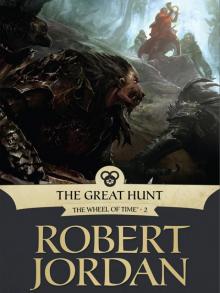 The Great Hunt
The Great Hunt Conan the Victorious
Conan the Victorious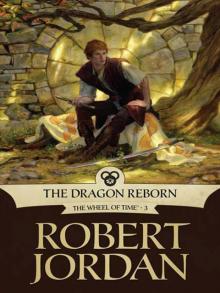 The Dragon Reborn
The Dragon Reborn The Fires of Heaven
The Fires of Heaven Winter's Heart
Winter's Heart Lord of Chaos
Lord of Chaos The Shadow Rising
The Shadow Rising Conan the Defender
Conan the Defender The Strike at Shayol Ghul
The Strike at Shayol Ghul The Path of Daggers
The Path of Daggers A Memory of Light
A Memory of Light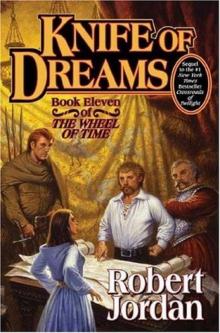 Knife of Dreams
Knife of Dreams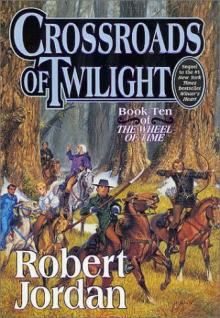 Crossroads of Twilight
Crossroads of Twilight Conan the Invincible
Conan the Invincible The Gathering Storm
The Gathering Storm Warrior of the Altaii
Warrior of the Altaii A Crown of Swords
A Crown of Swords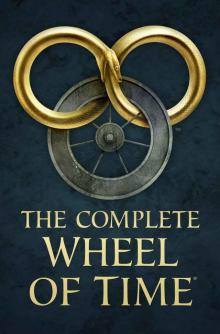 The Wheel of Time
The Wheel of Time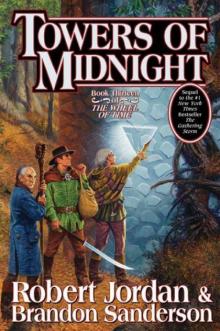 Towers of Midnight
Towers of Midnight Conan Chronicles 2
Conan Chronicles 2 Conan the Magnificent
Conan the Magnificent New Spring
New Spring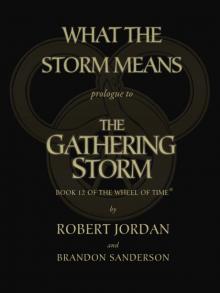 What the Storm Means
What the Storm Means A Memory of Light twot-14
A Memory of Light twot-14 New Spring: The Novel
New Spring: The Novel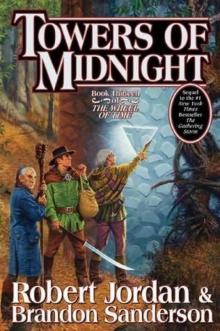 Towers of midnight wot-13
Towers of midnight wot-13 A Memory Of Light: Wheel of Time Book 14
A Memory Of Light: Wheel of Time Book 14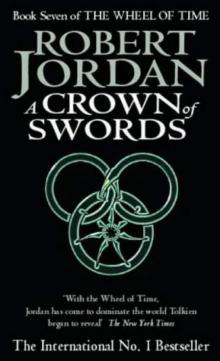 A Crown of Swords twot-7
A Crown of Swords twot-7 Lord of Chaos twot-6
Lord of Chaos twot-6 The Great Hunt twot-2
The Great Hunt twot-2 The Shadow Rising twot-4
The Shadow Rising twot-4![Wheel of Time-11] Knife of Dreams Read online](http://i1.bookreadfree.com/i1/04/03/wheel_of_time-11_knife_of_dreams_preview.jpg) Wheel of Time-11] Knife of Dreams
Wheel of Time-11] Knife of Dreams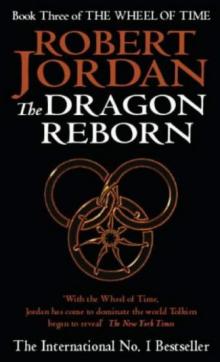 The Dragon Reborn twot-3
The Dragon Reborn twot-3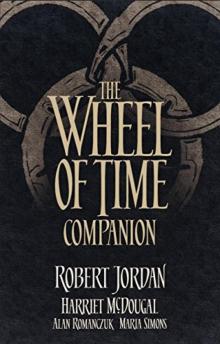 The Wheel of Time Companion
The Wheel of Time Companion The Fires of Heaven twot-5
The Fires of Heaven twot-5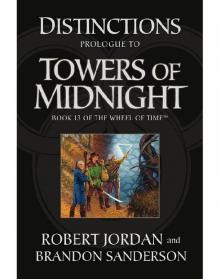 Prologue to Towers of Midnight
Prologue to Towers of Midnight The Path of Daggers - The Wheel of Time Book 8
The Path of Daggers - The Wheel of Time Book 8 The Path of Daggers twot-8
The Path of Daggers twot-8 By Grace and Banners Fallen: Prologue to a Memory of Light
By Grace and Banners Fallen: Prologue to a Memory of Light Crossroads of Twilight twot-10
Crossroads of Twilight twot-10 The Gathering Storm twot-12
The Gathering Storm twot-12 Winter's Heart twot-9
Winter's Heart twot-9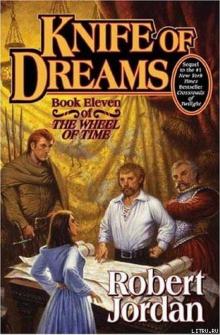 Knife of Dreams twot-11
Knife of Dreams twot-11 New Spring: The Novel (wheel of time)
New Spring: The Novel (wheel of time)